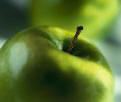Study: an Apple a Day Really Does Keep Doctor Away
Reuters
Nov. 17, 2004 - An apple a day really does keep the doctor away, thanks to strong antioxidants that fight cell damage, U.S. researchers reported on Tuesday.
Rat brain cells exposed to the antioxidant -- in this case quercetin -- resisted damage much better than those not treated, the team at Cornell University in New York found.
Antioxidants are compounds that counteract the damage done by chemicals known as free radicals -- generated by sunlight, chemical reactions and the stress of day-to-day living.
The researchers say their study adds strength to the theory that the risk of developing Alzheimer's and similar brain diseases might be reduced by eating plenty of fresh fruits and vegetables.
Writing in the Dec. 1 issue of the Journal of Agricultural and Food Chemistry, the Cornell team said they soaked rat brain cells in either quercetin or vitamin C -- another potent antioxidant.
The cells were then exposed to hydrogen peroxide to mimic the type of oxidative cell damage that is believed to occur with Alzheimer's disease.
Brain cells that were treated with quercetin had significantly less damage than the cells treated with vitamin C and cells that were not treated with antioxidants.
"On the basis of serving size, fresh apples have some of the highest levels of quercetin when compared to other fruits and vegetables and may be among the best food choices for fighting Alzheimer's," C.Y. Lee, a professor and chairman of the Department of Food Science & Technology at Cornell University, who led the study, said in a statement.
"People should eat more apples, especially fresh ones," he added.
Lee said the skins of apples contain the highest levels of quercetin so juice is not necessarily the best source.
In general, red apples tend to have more of the antioxidant than green or yellow ones, he said.
Other foods high in quercetin include onions, blueberries and cranberries.
